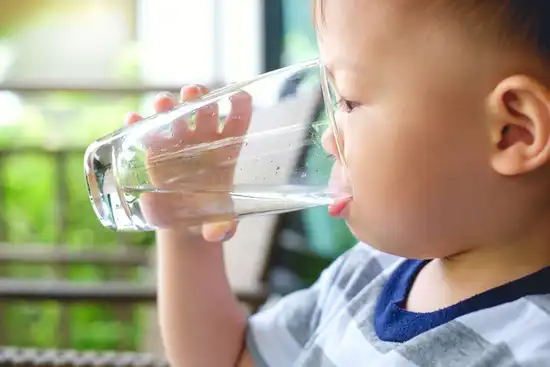Did you know that children sweat less than adults? When playing games or participating in sports, kids need to drink a lot of water to stay hydrated, particularly if they are outside in hot, muggy weather. Here’s how to hydrate your active child:

- Drink water. A child can stay hydrated naturally and healthily by drinking water. Unlike some sports drinks, sodas, and fruit juices, plain water has no calories or energy-boosters.
- Get ready. Children should drink plenty of water before actually playing sports or going outdoors.
- Get going on time. Children who are active or athletic should regularly drink fluids. Create a “fluid schedule” for them to follow before, during, and after practices, games, and meets to help them avoid becoming dehydrated.
If your child is exercising in hot, sunny, or humid weather or if they are perspiring a lot, they should drink more water.
How to Prevent Dehydration While Playing Sports
- Make them drink early. A child could already be dehydrated by the time they become thirsty.
- Give them enough water. The American Academy of Pediatrics recommends that children who weigh up to 88 pounds drink 5 ounces of cold water every 20 minutes. 9 ounces of cold water should be consumed every 20 minutes by kids and teenagers weighing up to 132 pounds. Two gulps of a child’s size make up one ounce.
- Things to avert: Caffeinated drinks (sodas, iced tea). Due to caffeine’s diuretic properties, the child may urinate more frequently, losing more fluid and dehydrating more quickly.

What Signs of Dehydration Do My Children Have?
Your child may be dehydrated if they exhibit any of the following signs:
- Headache
- Nausea/vomiting
- Pees less
- Yellow-colored pee
- Overly weary
- Nausea/passes out
Home care or a doctor’s appointment?
You might be able to hydrate your child at home:
- Have them keep consuming unsweetened liquids.
- Give them food.
- Motivate them to take a nap.
- Keep an eye out for any additional symptoms.
Consult a physician if:
- Any symptom they have gets worse.
- They are constipated.
- They appear more drowsy or lethargic than usual.
- They pass out or appear confused.
